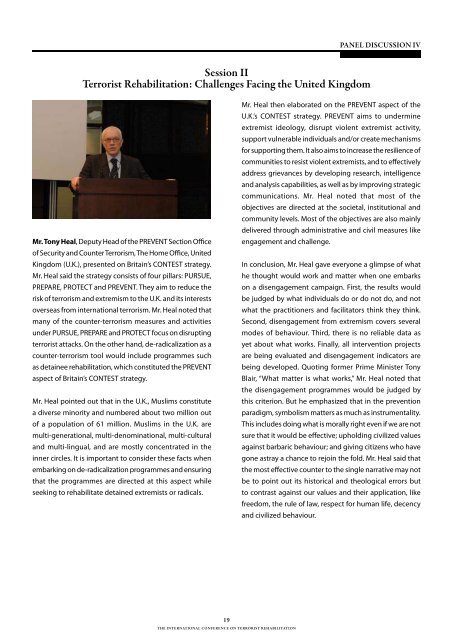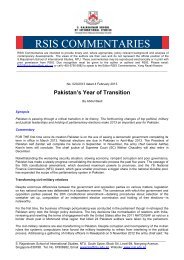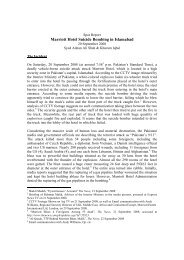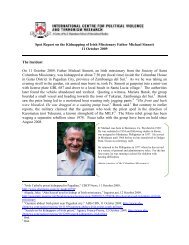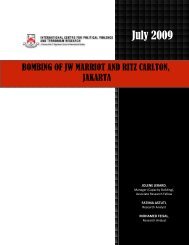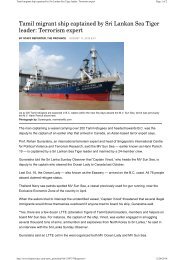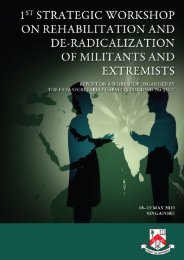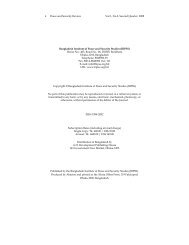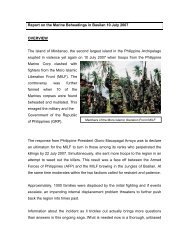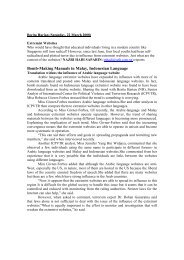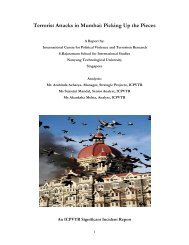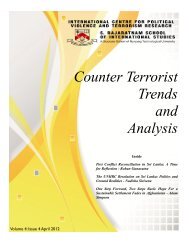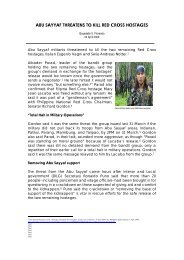International Conference On Terrorist Rehabilitation
International Conference On Terrorist Rehabilitation
International Conference On Terrorist Rehabilitation
You also want an ePaper? Increase the reach of your titles
YUMPU automatically turns print PDFs into web optimized ePapers that Google loves.
PANEL DISCUSSION IV<br />
Session II<br />
<strong>Terrorist</strong> <strong>Rehabilitation</strong>: Challenges Facing the United Kingdom<br />
Mr. Tony Heal, Deputy Head of the PREVENT Section Office<br />
of Security and Counter Terrorism, The Home Office, United<br />
Kingdom (U.K.), presented on Britain’s CONTEST strategy.<br />
Mr. Heal said the strategy consists of four pillars: PURSUE,<br />
PREPARE, PROTECT and PREVENT. They aim to reduce the<br />
risk of terrorism and extremism to the U.K. and its interests<br />
overseas from international terrorism. Mr. Heal noted that<br />
many of the counter-terrorism measures and activities<br />
under PURSUE, PREPARE and PROTECT focus on disrupting<br />
terrorist attacks. <strong>On</strong> the other hand, de-radicalization as a<br />
counter-terrorism tool would include programmes such<br />
as detainee rehabilitation, which constituted the PREVENT<br />
aspect of Britain’s CONTEST strategy.<br />
Mr. Heal pointed out that in the U.K., Muslims constitute<br />
a diverse minority and numbered about two million out<br />
of a population of 61 million. Muslims in the U.K. are<br />
multi-generational, multi-denominational, multi-cultural<br />
and multi-lingual, and are mostly concentrated in the<br />
inner circles. It is important to consider these facts when<br />
embarking on de-radicalization programmes and ensuring<br />
that the programmes are directed at this aspect while<br />
seeking to rehabilitate detained extremists or radicals.<br />
Mr. Heal then elaborated on the PREVENT aspect of the<br />
U.K.’s CONTEST strategy. PREVENT aims to undermine<br />
extremist ideology, disrupt violent extremist activity,<br />
support vulnerable individuals and/or create mechanisms<br />
for supporting them. It also aims to increase the resilience of<br />
communities to resist violent extremists, and to effectively<br />
address grievances by developing research, intelligence<br />
and analysis capabilities, as well as by improving strategic<br />
communications. Mr. Heal noted that most of the<br />
objectives are directed at the societal, institutional and<br />
community levels. Most of the objectives are also mainly<br />
delivered through administrative and civil measures like<br />
engagement and challenge.<br />
In conclusion, Mr. Heal gave everyone a glimpse of what<br />
he thought would work and matter when one embarks<br />
on a disengagement campaign. First, the results would<br />
be judged by what individuals do or do not do, and not<br />
what the practitioners and facilitators think they think.<br />
Second, disengagement from extremism covers several<br />
modes of behaviour. Third, there is no reliable data as<br />
yet about what works. Finally, all intervention projects<br />
are being evaluated and disengagement indicators are<br />
being developed. Quoting former Prime Minister Tony<br />
Blair, “What matter is what works,” Mr. Heal noted that<br />
the disengagement programmes would be judged by<br />
this criterion. But he emphasized that in the prevention<br />
paradigm, symbolism matters as much as instrumentality.<br />
This includes doing what is morally right even if we are not<br />
sure that it would be effective; upholding civilized values<br />
against barbaric behaviour; and giving citizens who have<br />
gone astray a chance to rejoin the fold. Mr. Heal said that<br />
the most effective counter to the single narrative may not<br />
be to point out its historical and theological errors but<br />
to contrast against our values and their application, like<br />
freedom, the rule of law, respect for human life, decency<br />
and civilized behaviour.<br />
19<br />
THE INTERNATIONAL CONFERENCE ON TERRORIST REHABILITATION


